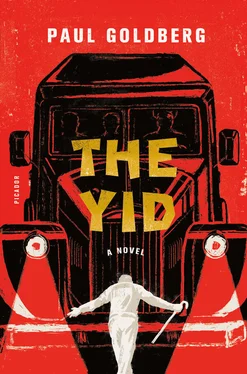As the train passes them, the engineer blows the whistle wildly. Does he catch a glimpse of the nighttime skiers? Is he drunk? Is his celebratory mood triggered by anticipation of some great national event? The composition of his train is unusual in the extreme. There are no tank cars, no platforms, only freight cars and two passenger cars. The train is pulled by an Iosif Stalin.
“I counted forty-nine freight and two passenger,” says Lewis.
Kima says nothing.
“Were you able to read the inscription on the passenger cars? Someone forgot to take it off.”
Kima nods, her chin jutting at that forty-five-degree angle. Lewis gives her a few minutes to seize control over her feelings.
“I couldn’t read it,” he says eventually, a subtle reminder. “The cars looked prewar.”
“Omsk-Novosibirsk,” she says.
“Why are they here? That’s halfway through the Trans-Siberian.”
He knows the answer, of course.
“Dlya okhrany,” she answers. For the guards.
Of course. The entire railroad system is being taxed to produce freight cars and assorted passenger cars in preparation for some event taking place in Moscow and, presumably, other major cities. Is it possible to accept that preparations for a mass deportation of Jews are indeed afoot? Can competing hypotheses be finally dispensed with, eliminated?
“Now, the locomotive, that was clearly something else,” notes Lewis. “An IS! Iosif Stalin! Have you ever seen an IS pull freight?”
Kima nods. “I have.” Then, looking into Lewis’s eyes, she adds, “Once.”
* * *
As a spare spur branches off to the right, Kima and Lewis follow. There is no longer a road. They stomp slowly through the brush in a new-growth forest.
After half a kilometer, Kima and Lewis reach a waiting train. Smoke is rising from the chimney of a green caboose. A group of men, at least four of them, can be seen playing cards by kerosene light.
Lewis raises his finger to his lips and points toward the woods. They are now fifty meters from the train. The going is slow. No more easy gliding. Snow is making its way into their boots, and sharp brush blocks their way. They are making entirely too much noise, but they move forward toward the locomotive.
“Forty freight cars, one passenger,” whispers Lewis.
“No platforms, no tank cars,” says Kima.
“We are fucked,” says Lewis in English.
“Khudo nam,” Kima translates into Russian, and for the first time Lewis sees the outline of a smile on her face.
“Farflokhtn,” says Lewis.
Once again, Lewis raises his hand to his lips. He hears footsteps. It could be a guard or a railroad worker. He carries no lantern and has a look of a drunk.
“So when does it begin?” asks Lewis.
Kima is silent.
“It can’t be too far away,” he continues in a whisper. “Do you know what I have to go through to get a few lousy freight cars? I have to beg somewhere, know somebody, make promises. And here they are, standing idle, an entire train, waiting for the devil knows what.”
Lewis thinks he understands the reasons for her silence.
He suffered from a similar affliction until his mid-twenties, before he joined a circle of enlightened workers that met at various spots in Chicago to argue passionately about the correctness of competing revolutionary ideologies.
“What we need is the routing chart,” he says.
Is he trying to impress Kima, to break through to her that it’s okay to talk? Or is her silence making him nervous?
“It would tell us where they came from, their destination, their time of arrival…”
She stares at him now, saying nothing, letting her burning cobalt eyes do the work of making him squirm.
“And their time of arrival would likely tell us the very thing we need to know…”
“What?” she replies loudly, confirming Lewis’s fear that he has gone on a reconnaissance mission with a partner who lacks caution and is, in her heart of hearts, looking for a bullet.
“What would it tell us?” she repeats in a voice that seems to boom in the quiet of the night.
“It would tell us when it begins,” he whispers.
With no warning, before Lewis is able to stop her, Kima unstraps her skis, stands up, and, stretching to her full height, unhurriedly steps out of the snowbank and heads toward the locomotive.
“Oh, fuck,” whispers Lewis in English, then, after taking off his skis, he pulls the pistol out of the pocket of his sheepskin coat.
Crouched and running toward the locomotive, he repeats the word rhythmically, like a chant. “We are fucked … fucked … fucked…”
“Ty chto, okhuyela?” he whispers, catching up and grabbing her by the shoulder. Now they stand by the bumper of the locomotive. Have you gone fucking nuts?
The locomotive is an SO 1-5-0. Kima’s actions continue to be consistent with Lewis’s diagnosis. She pulls her shoulder out of his grip, grabs onto the ladder, and climbs into the engineer’s cab.
Cold sweat streams from every pore of Lewis’s skin.
He fears death, of course, but there is something he fears even more. He fears dying stupidly, gratuitously, Russian style.
Consider Tatyana. How much technical knowledge did it require to realize that ice melts in the spring? Wasn’t it obvious that after the swamps melt, an army loses its capacity to either advance or retreat? It bogs down, literally, without food, water, or ammunition. Had the Second Shock Army been allowed to break through to Leningrad or, failing that, pull back before the thaw, Tatyana might well have survived.
“Americans have their baseball, their greed, their nigger bashing. Russia’s national sports are alcoholism, violent idiocy, and Jew baiting,” Lewis thinks as he crouches alongside the mighty tank of the SO locomotive, pistol in hand.
The girl is inside the locomotive now, and by the time he climbs in, she is fiddling with the lock of a large steel box next to the engineer’s seat. The box is locked.
“Dayte pistolet,” she orders. Give me the gun.
Who the fuck does she think she is? Worse, she is addressing him formally— dayte , not day —like a child addressing an elder.
“Get out,” he shouts in Russian. “Have you fucking heard of ricochet? This place is all steel. I’d need to hit the lock.”
As they get out of the cab, Lewis aims and shoots. The bullet ricochets madly. He shoots again, then again, finally hitting the lock.
She hops inside, reaches into the box, grabs the logbook, and rips out a half-dozen pages.
Surely the shots were heard in the caboose, but that’s forty cars away, far enough to allow Lewis and Kima to disappear into the night.
They run toward their skis, and a few minutes later, they are on a road gliding away from the tracks, toward Malakhovka’s lake.
Glancing at the stars and the full moon, Lewis thinks of a text that crept into his memory years ago. This isn’t a prayer for the dead, but something closely related.
It’s a small provision of Article 58 of the USSR Criminal Code: “the undermining of state production, transport, trade, monetary relations or the credit system…” The punishment is, of course, the firing squad; it would be one of a series of death sentences so squarely earned by the conspirators.
They don’t speak on the run back to Malakhovka, and as they reach the barracks, Kima silently hands him the sheets of paper and turns off the road.
He takes it as a fuck-you. There can be no good-bye. Though the operation was a success — information was obtained and no one is dead — Lewis seethes at the young woman he now calls the suicidal little bitch.
Inside the dacha, he throws the papers on the table, in front of Levinson.
Читать дальше












